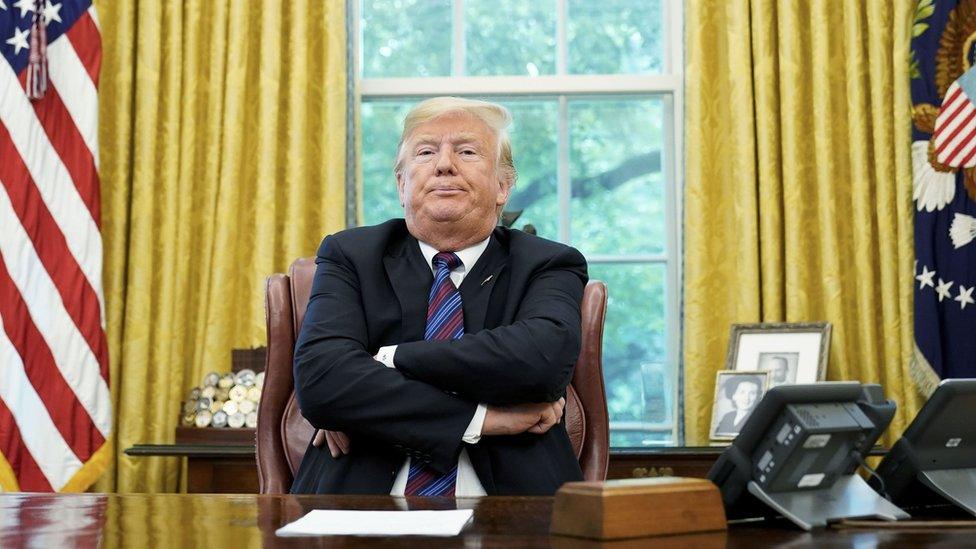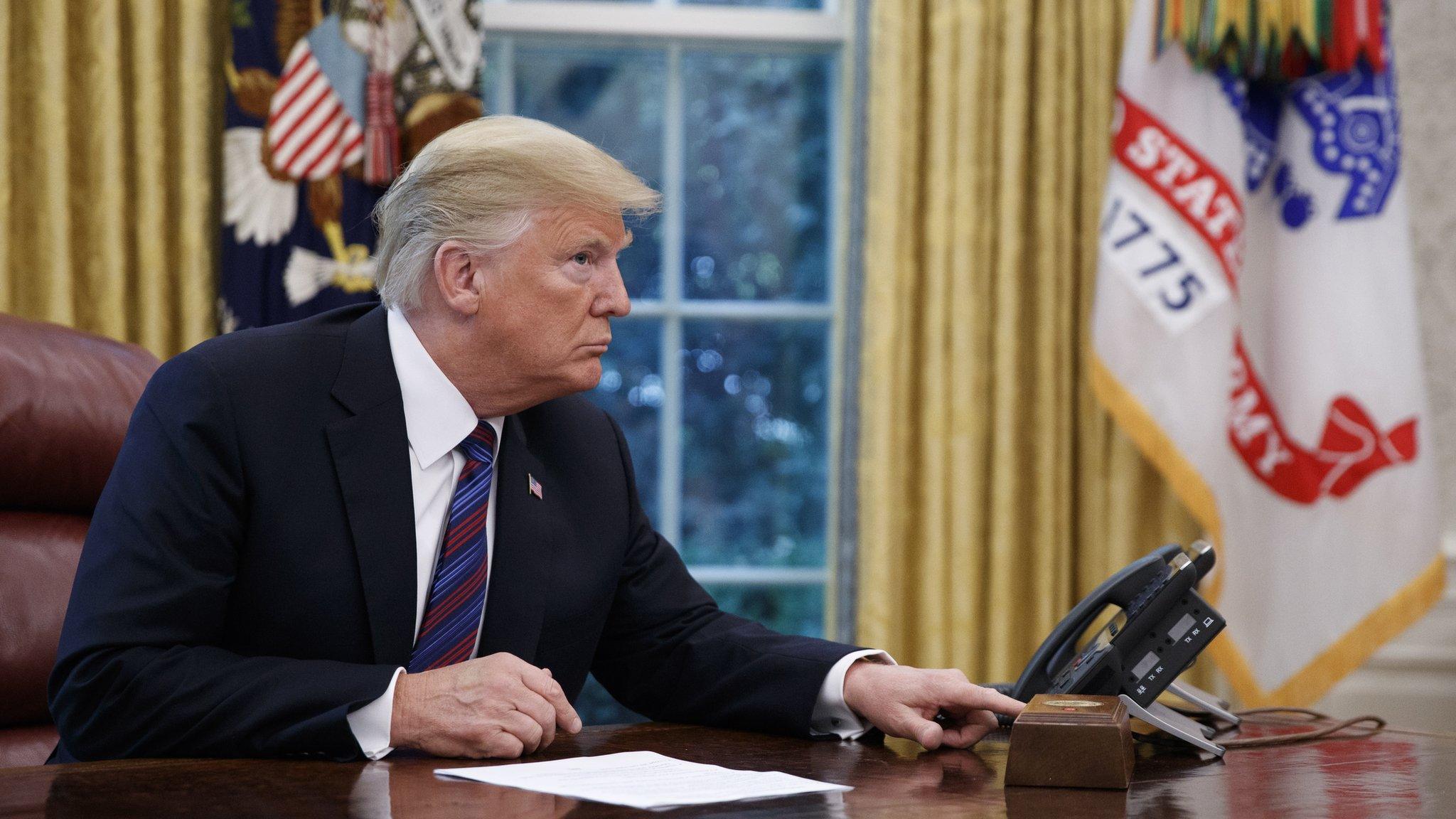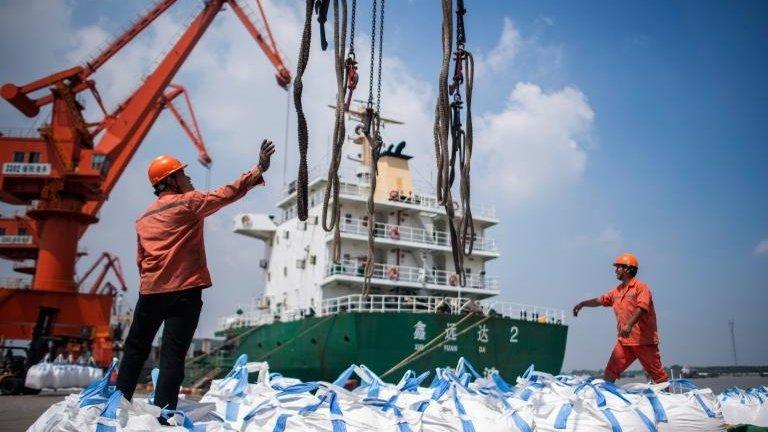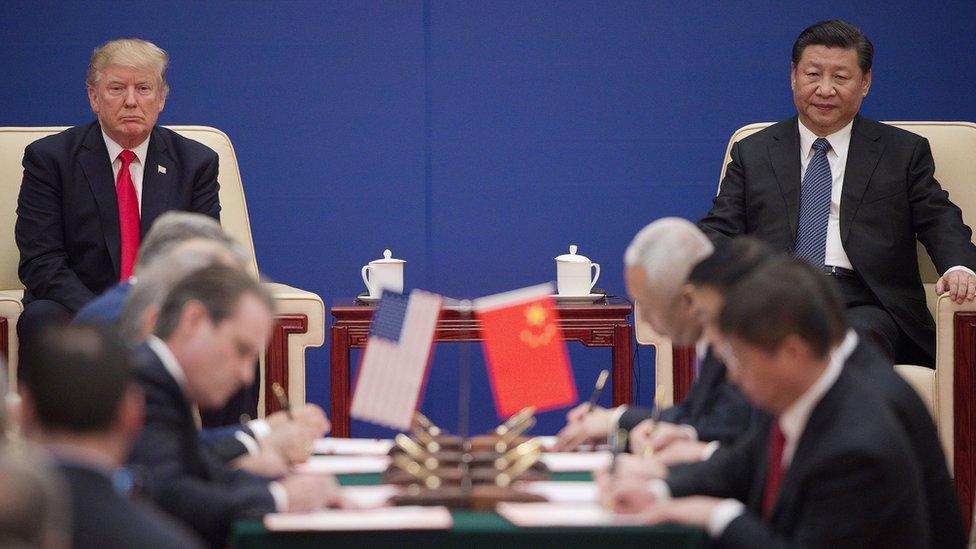Nafta: US-Canada trade talks break up without a deal
- Published

Donald Trump announced a deal with Mexico this week but Canada remains on the sidelines
Talks between the US and Canada about amending the North American Free Trade Agreement (Nafta) have ended for the week without reaching a deal.
US officials said they would meet their Canadian counterparts again next week in an effort to reach agreement.
For now, the US plans to move forward with a deal with Mexico on terms reached earlier in the week.
It's not clear what this means for the trilateral agreement, which governs more than $1tr (£770bn) in trade.
The White House had faced a Friday deadline to provide Congress with the necessary 90 days' notice that it intended to enter into a new trade agreement and still have the new Nafta deal signed by 1 December, the day Mexico's new left-wing President Andres Manuel Lopez Obrador takes office.
Why no deal?
The US wants Canada to open up access to US dairy products, extend patent protections for medicines and agree to eliminate international panels to resolve most disputes between investors and governments.
Dairy in particular appeared to be an issue on Friday, with US officials saying Canada had made no concessions on agriculture and Canadian Prime Minister Justin Trudeau saying he was standing firm on the issue.
Canadian Foreign Affairs Minister Chrystia Freeland said on Friday afternoon that the two countries are making progress and that an agreement is "within reach".
"With goodwill and flexibility on all sides we can get there," she said.
She also said Canada does not feel the same deadline pressure as the US.
"For Canada, the focus is on getting a good deal and once we have a good deal for Canada, we'll be done," she said.
If Nafta trade deal was a hamburger...
What next?
President Donald Trump notified Congress on Friday that he intended to sign a new trade agreement with Mexico in 90 days, and Canada "if it is willing", US Trade Representative Robert Lighthizer said.
He said talks with Canada this week had been "constructive". Officials said the US is on track to present text of the agreement in 30 days.
"Our officials are continuing to work toward agreement. The USTR team will meet with Minister Freeland and her colleagues Wednesday of next week," Mr Lighthizer said.
Mr Trump said earlier this week he was willing to cut Canada out of the pact.
But it is not clear whether Congress, which has final say over trade agreements, will accept a deal if Canada is not part of it.
Several senators have questioned whether the White House has the authority to negotiate a deal without Canada.
Business groups have also said it is critical that Canada be part of any agreement.
"Anything other than a trilateral agreement won't win Congressional approval and would lose business support," said Thomas Donahue, president of the US Chamber of Commerce.
Where does Mexico stand?
The preliminary agreement announced by the US and Mexico earlier this week included provisions aimed at boosting vehicle production in North America and easing online commerce, among other matters.
On Friday, Mexico's Economy Minister Ildefonso Guajardo hailed the US decision to notify Congress as a sign of progress.
Mexico will continue to press for Canada to remain in the updated accord, he added.
What has Trump said?
Donald Trump speaks with the Mexican leader on the phone through an interpreter
Mr Trump has taken a tough-talking approach to Canada and threatened to levy tariffs on car parts exported from Canada to the US if a deal is not reached.
In off-the-record comments made to Bloomberg on Thursday and leaked to the Toronto Star, he boasted that any deal with Canada would be "totally on our terms".
"Here's the problem. If I say no - the answer's no," he said according to the report.
The president later acknowledged the remarks in a tweet, saying: "At least Canada knows where I stand!"
Allow X content?
This article contains content provided by X. We ask for your permission before anything is loaded, as they may be using cookies and other technologies. You may want to read X’s cookie policy, external and privacy policy, external before accepting. To view this content choose ‘accept and continue’.

Mr Trump has also frequently expressed his distaste for multilateral trade agreements, especially Nafta.
In a 2016 presidential debate with Democratic rival Hillary Clinton, he described Nafta as "the worst trade deal maybe ever signed anywhere" and a "killer" of US jobs.
Once in office he said he wanted to renegotiate - not scrap - the accord, triggering the last year of talks.
Any other trade issues?
The US has been embroiled in a tit-for-tat trade battle on several fronts in recent months.
It has imposed tariffs on steel and aluminium, including from Mexico, Canada and the European Union.
It is also engaged in a tit-for-tat trade war with China, as the world's two largest economies wrangle for global influence and place tariffs on each others' goods.
A third round of US tariffs on $200bn (£154bn) of Chinese goods could come as soon as next week, according to a Bloomberg report. Asked to confirm this during the Bloomberg interview, President Trump said that it was "not totally wrong".
Mr Trump has also threatened to place tariffs on imports of cars and vehicle parts, prompting a stand-off with the European Union.
- Published28 August 2018

- Published24 August 2018

- Published5 August 2018
